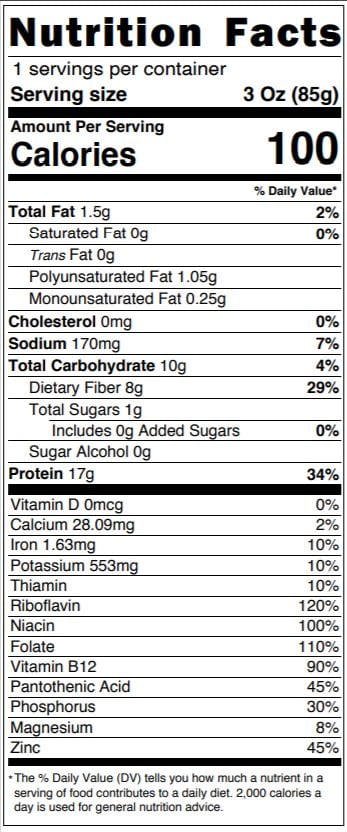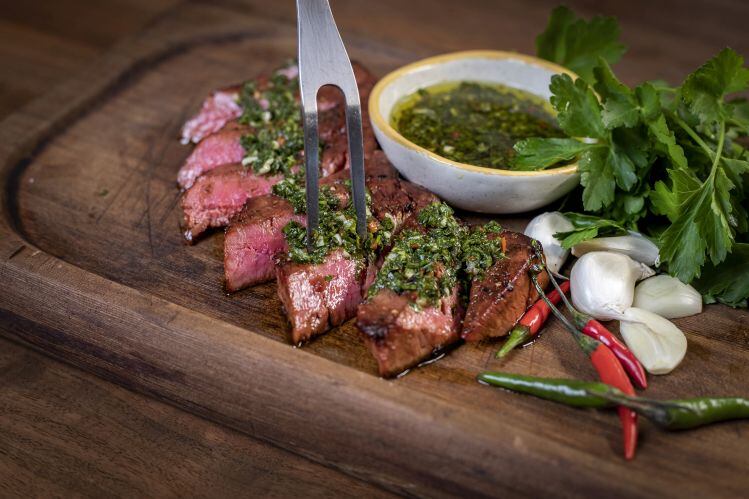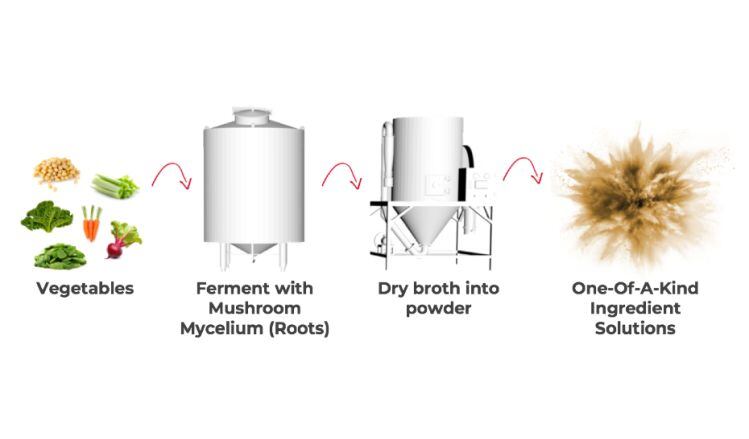The toolkit for meat-free formulators is growing by the day, as firms explore everything from yeast, bacteria and algae to new sources of plant-protein as source materials, although most still use extruded soy, peas or wheat, Meati co-founder Tyler Huggins told FoodNavigator-USA. However, brands have struggled to create realistic steaks, chicken breasts or other whole cuts.
Boulder, CO-based Meati Foods uses a naturally occurring organism – a strain of mycelia, the filamentous-like root structures of mushrooms (although some mycelia have no visible mushroom ‘cap,' including the variety that Meati uses) - that is inherently high in protein and fiber, and can be grown highly-efficiently in fermentation tanks fed with “sugar water,” said Huggins.
“We searched all the libraries of filamentous fungi and whittled them down slowly but surely until we found the one we’re using now. Our particular strain doesn’t produce mushroom caps. It’s a trade secret for the time being, and we had to create a whole new way of cultivation for it, so everything from the fermentation, the environmental conditions… the downstream post processing is also protectable, so we’ve filed multiple patents."
Complete protein
He added: “It’s got no inherent flavor and it’s bright white with long fibrous filaments that mimic muscle structure. It’s also really high in protein, much higher than Atlast [which is also developing edible 3D structures from mycelia, beginning with bacon]. We’re at greater than 60% by weight protein and we have a PDCAAS score of 1, which is similar to eggs and milk; there are few single plant-based proteins like this."
18-hour batch time
When it comes to growing conditions, he said, “We’re a little different to Atlast [which grows mycelium in trays via solid state fermentation to create white meaty slabs that can be cut and sliced] as we’re using a submerged fermentation process, so we’re growing our mycelia in a process similar to brewing beer in fermentation tanks, so the speed of growth is incredible, we’re talking about a 18-hour batch time.
“As we harvest it we can realign the fibers in different orientations, making chicken breasts or beefsteak, which is harder if you’re using solid state approach. We harvest using a mechanical process, and it’s a whole food, so we’re not extracting proteins.”
'What we’re doing is like urban agriculture for protein'
A GRAS determination for the ingredient – which would be labeled as ‘mycelium’ on US ingredients lists - has been put together, and will be sent to the FDA in due course, said Huggins.
“People are looking for something new and exciting, and I think we’re going to see a whole new category of fungi-based products, which is awesome.”
He added: “The FDA considers mushrooms as part of the plant-based category, so we could tap into that [trend], but we see an opportunity to talk about fungi-based as a whole new category with a short simple ingredients list, a whole, all natural product with an improved nutritional profile, and when we talk to consumers, they love this idea.
"What we’re doing is like urban agriculture for protein.”

Ingredients, Meati Foods steak: Mycelium, Marinade (Water, Kombu Seaweed, Natural Colors, Chickpea Miso (organic handmade rice koji (organic rice, koji spores (Aspergillus oryzae)), organic whole chickpeas, sundried sea salt, Blue ridge Mtn well water), Natural Flavors, Shiitake Mushrooms, Houjicha Green Tea, Porchini Mushrooms)
3oz of Meati Fungi-Based Steak contains 17g of complete protein, 8g fiber, 90% of the DV for vitamin B12 (a nutrient not typically found in plants), more potassium than a banana, and zero cholesterol.
Funding
The nutrition of the steaks is tunable, in that it can be altered through the addition of nutrients to the growth medium, said Huggins, who has raised around $8m in equity and another $3m in government grant money with co-founder Justin Whiteley and is looking to raise a Series A round shortly.
However, this doesn’t mean that you have to add tons of ultra-expensive nutrients to the medium to get anything decent out of the fungi, he said.
“We tuned the growth media to bump the iron up to be close to beef, but the media is what we call in the field, ‘minimal media’ as fungi are really good at making their own proteins for example.”
The go-to-market strategy
The go-to-market strategy is “evolving constantly” given the pandemic, said Huggins, who recently launched Meati steaks at the Salt Bistro restaurant in Boulder, CO, where they have been a huge hit, with more partnerships in the pipeline.
"We will be partnering with chefs, thought leaders, and restaurant owners who have the same mission of making the food of the future, ie. nutritious, delicious and sustainable."
A direct to consumer launch is planned for later this year, followed by a retail launch in late 2021, he added.
“In the early stages we’ll be priced at a premium, but ultimately the beauty of our technology is that we can be cost competitive to traditional animal-based products."
“Although we only opened our headquarters in June of 2019, we have made substantial inroads in just one year: we’ve gone from three to 15 employees, scaled our production technology, launched in a restaurant, refined our products, and laid groundwork to increase our distribution.”
Justin Whiteley, co-founder and CTO, Meati Foods





